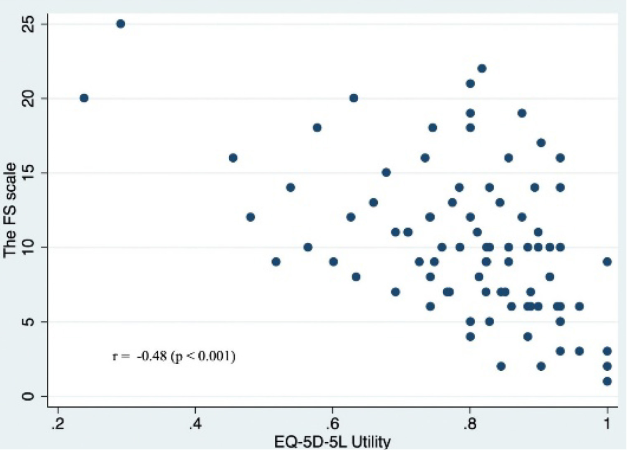RELIABILITY, VALIDITY AND AGREEMENT OF THE THAI SELF-REPORTED FIBROMYALGIA SURVEY QUESTIONNAIRE AMONG PATIENTS WITH CHRONIC MUSCULOSKELETAL PAIN
DOI:
https://doi.org/10.55374/jseamed.v7.172Keywords:
Fibromyalgia, Questionnaire, Reliability, Validity, AgreementAbstract
Background: Fibromyalgia (FM) diagnosis is typically based on the American College of Rheumatology (ACR) criteria, relying on patient-reported symptoms. The Thai self-reported Fibromyalgia Survey Questionnaire (FSQ) was developed based on the 2016 version of the ACR criteria set.
Objectives: This study aimed to evaluate the internal consistency, convergent validity and agreement of the self-reported FSQ compared with the telephone interview of a physician among patients with chronic musculoskeletal pain.
Methods: The Thai FSQ consisting of 25 questions: 19 for widespread pain index (WPI) and 6 for symptom severity scale (SSS), was developed by three Thai physiatrists. The fibromyalgia severity (FS) scale (the sum of WPI and SSS: 0-31) of 13 or more was used to diagnose fibromyalgia. All participants completed a self-reported paper research questionnaire in a private room. Then 24-48 hours later, participants underwent a telephone interview with the Thai FSQ. The internal consistency and convergent validity of the Thai self-reported FSQ were assessed using Cronbach’s alpha and Pearson’s correlation, respectively. The agreement between the Thai self-reported FSQ (FS scale ≥13) and the telephone interview using the 2016 ACR criteria for diagnosing fibromyalgia was evaluated using Cohen’s kappa.
Results: Of 89 participants, the majority were females (66.3%) with a mean age of 53.5±15.9 years and had an educational level of bachelor’s degree or higher (79.7%). Cronbach’s alpha was 0.82, while the correlation between the FS scale and EQ-5D-5L utility was -0.48 (p <0.001). Cohen’s kappa for diagnosis agreement was 0.55 (p < 0.001).
Conclusion: The Thai self-reported FSQ exhibited good internal consistency and moderate construct validity. The diagnostic agreement of the Thai self-reported FSQ with the telephone interview was moderate. Although this questionnaire could be used as a screening tool, physicians would need to confirm the diagnosis of fibromyalgia.
Downloads
Metrics
References
Wolfe F, Clauw DJ, Fitzcharles MA, Goldenberg DL, Katz RS, Mease P, et al. The American College of Rheumatology preliminary diagnostic criteria for fibromyalgia and measurement of symptom severity. Arthritis Care Res (Hoboken) 2010; 62: 600-10. DOI: https://doi.org/10.1002/acr.20140
Prateepavanich P, Kattinanon D, Suwannakin A. The Prevalence of Fibromyalgia in Chronic Myofascial Pain Syndrome Patients. J Thai Rehabil Med 2017; 27: 71-6.
Sarzi-Puttini P, Giorgi V, Marotto D, Atzeni F. Fibromyalgia: an update on clinical characteristics, aetiopathogenesis and treatment. Nat Rev Rheumatol 2020; 16: 645-60. DOI: https://doi.org/10.1038/s41584-020-00506-w
Wolfe F, Clauw DJ, Fitzcharles MA, Goldenberg DL, Hauser W, Katz RS, et al. Fibromyalgia criteria and severity scales for clinical and epidemiological studies: a modification of the ACR Preliminary Diagnostic Criteria for Fibromyalgia. J Rheumatol 2011; 38: 1113-22. DOI: https://doi.org/10.3899/jrheum.100594
Wolfe F, Clauw DJ, Fitzcharles MA, Goldenberg DL, Hauser W, Katz RL, et al. Revisions to the 2010/2011 fibromyalgia diagnostic criteria. Semin Arthritis Rheum. 2016; 46: 319-29. DOI: https://doi.org/10.1016/j.semarthrit.2016.08.012
Bidari A, Ghavidel-Parsa B, Amir Maafi A, Montazeri A, Ghalehbaghi B, Hassankhani A, et al. Validation of fibromyalgia survey questionnaire and polysymptomatic distress scale in a Persian population. Rheumatol Int 2015; 35: 2013-9. DOI: https://doi.org/10.1007/s00296-015-3340-z
Daltrozo JB, Paupitz JA, Neves FS. Validity of the fibromyalgia survey questionnaire (2016) assessed by telephone interview and cross-cultural adaptation to Brazilian Portuguese language. Adv Rheumatol 2020; 60 :37. DOI: https://doi.org/10.1186/s42358-020-00139-3
Hauser W, Jung E, Erbsloh-Moller B, Gesmann M, Kuhn-Becker H, Petermann F, et al. Validation of the Fibromyalgia Survey Questionnaire within a cross-sectional survey. PLoS One 2012; 7: e37504. DOI: https://doi.org/10.1371/journal.pone.0037504
Varallo G, Ghiggia A, Arreghini M, Capodaglio P, Manzoni GM, Giusti EM, et al. The Reliability and Agreement of the Fibromyalgia Survey Questionnaire in an Italian Sample of Obese Patients. Front Psychol 2021; 12: 623183. DOI: https://doi.org/10.3389/fpsyg.2021.623183
Pattanaphesaj J, Thavorncharoensap M, Ramos-Goni JM, Tongsiri S, Ingsrisawang L, Teerawattananon Y. The EQ-5D-5L Valuation study in Thailand. Expert Rev Pharmacoecon Outcomes Res 2018; 18: 551-8. DOI: https://doi.org/10.1080/14737167.2018.1494574

Downloads
Additional Files
Published
How to Cite
Issue
Section
License
The Journal of Southeast Asian Medical Research will hold the copyright to all published articles. The publisher's production department handles copyright forms once a manuscript is accepted and scheduled for publication.







